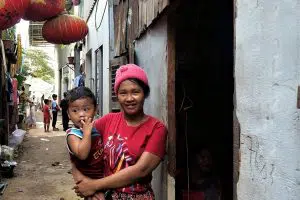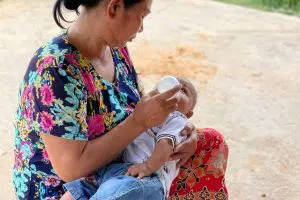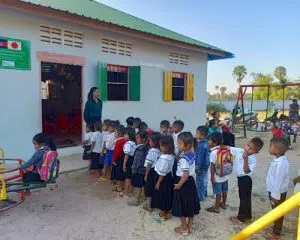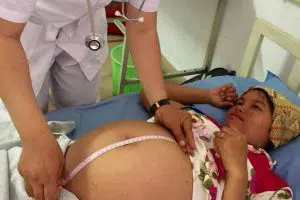Cambodia
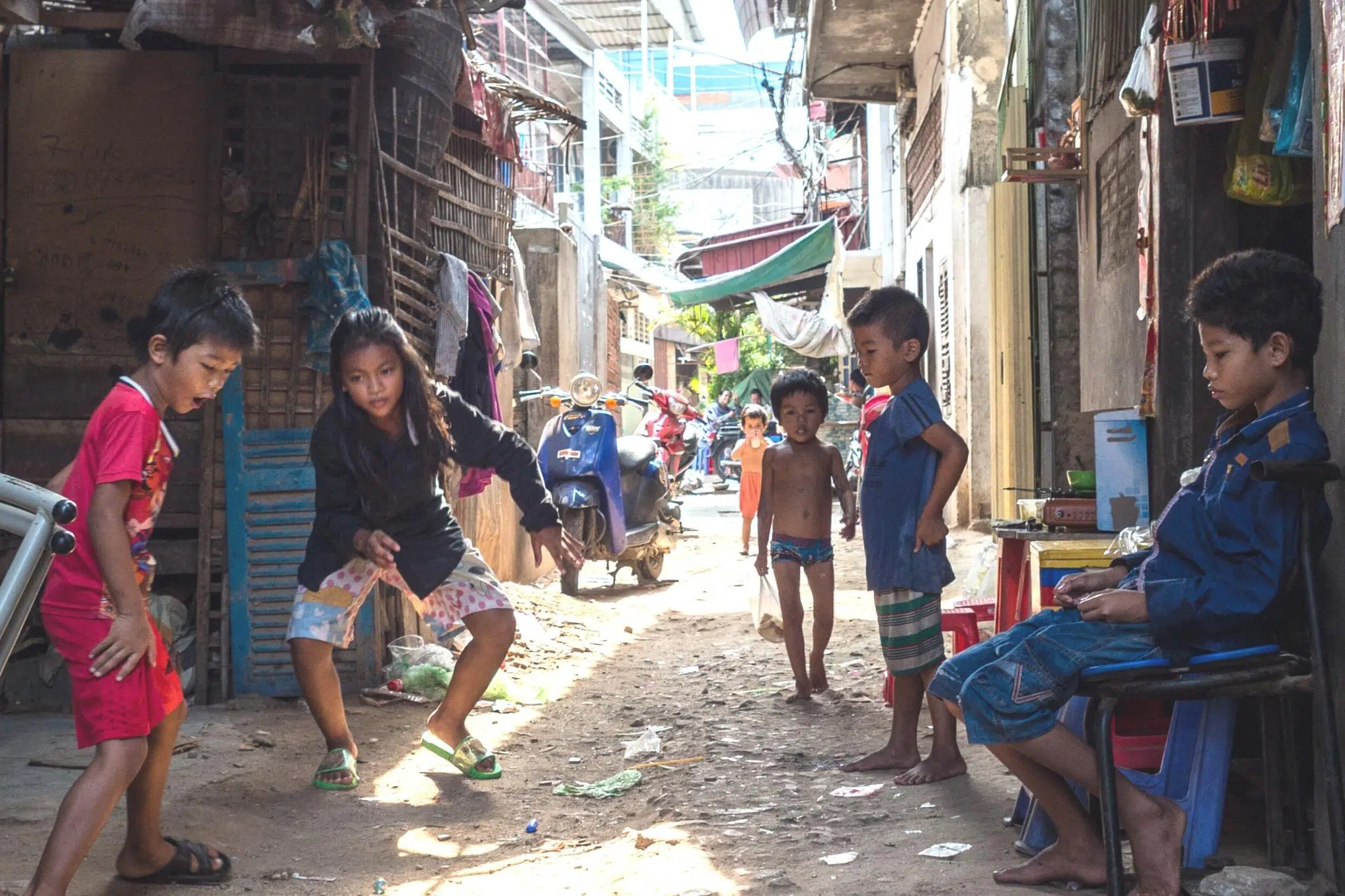
Social support for families | Protecting women and children against violence 2018-2020 (Phase 1); 2021- 2024 (phase 2)
Support for families and children in the slums of Phnom Penh (HaLI)
In 20 years, the population of Phnom Penh, the capital of Cambodia, has tripled. The city is struggling to absorb these new inhabitants. There are now nearly 300 precarious communities or slums, where children and families live in great poverty.
Share this project:
Support us:
The context
When the Khmer Rouge came to power in 1975, they established a dictatorship. They evacuated the city of Phnom Penh in three days and destroyed the property titles. When they fell in 1979, the survivors returned to the capital and without property titles, settled on public land near rivers, canals and lakes.
Numerous precarious neighborhoods and shantytowns have been formed since the 1980s, fueled by a constant rural exodus. The consequences of climate change (repeated droughts or floods) and the harshness of agricultural work are pushing the inhabitants of the countryside to try their luck in town.
Since the 2000s, foreign investment by developers and large urban development projects have multiplied.
The contrast between the new buildings that dominate the capital and the slums that are just a few steps away from the new districts is striking.
If some inhabitants managed to receive titles from the State allowing them to stay, many families are still at risk of evictionMost of the time without any compensation or rehousing solutions.
Today, it is estimated that 25% of Phnom Penh residents live in slum areas. These families and children face many challenges on a daily basis:
- permanent risk of eviction
- unsafe housing that is regularly flooded during the rainy season
- limited access to clean water and sanitation
- lack of waste management
- high unemployment rate
> These are all difficulties that lead to health, financial and social problems water-related diseases, alcohol, drug and gambling addiction, domestic violence.
How is your donation used?
For every €100 raised by Planète Enfants & Développement, €81.4 goes to our social mission.
Our projects are evaluated by independent firms. And our accounts are audited and certified each year by KPMG.
family lives in a slum in Phnom Penh
%
of the 373 families we interviewed lost their income because of Covid-19
%
of these families lack the money to feed themselves
The project
Planète Enfants & Développement and its Cambodian partner SKO have been implementing an ambitious program to improve living and housing conditions in these precarious neighborhoods since 2018.
With the 2nd phase of the program starting in July 2021, we are working in 8 neighborhoods in the suburbs of Phnom Penh.
Psychosocial support for families
The families most in difficulty are identified by social workers and accompanied for 6 to 12 months towards the progressive and autonomous resolution of their problems. Since the start of the second phase, 200 new families have been identified and supported. (40% have emerged with significant improvements).
Cases of domestic violence are dealt with specifically. A listening service has been opened in the Project House, in the heart of the neighborhoods and accessible to all residents.
Since January 2021, we have also been facilitating, with SKO, group discussion sessions on issues related to gender, gender equality and parenting in particular. Involving men in these groups is a priority to initiate a long-term change in mentalities but remains a challenge.
We also train families in the household budget management. These sessions get them thinking and talking about financial issues related to addiction or gambling, but also about everyone's place in the household.
Savings and credit groups are also set up in each neighborhood: based on the principle of solidarity, they allow residents to finance their immediate needs (hospitalization, schooling, etc.) and their small projects.
We are also working on a partnership with a local association specializing in vocational training and the development of income-generating activities to open up new employment prospects for this precarious population. In 2023, nearly one hundred people were supported in their professional integration or in the development of their micro-enterprise. Finally, to relieve the family budget, urban agriculture projects have been developed. Farming kits have been distributed to residents. Training was provided in environmentally-friendly farming practices and constraints.
Home improvement
To keep children and families out of harm's way, we offer tailor-made solutions to renovate the most dilapidated homes. We offer renovation kits to the occupants of substandard houses, according to their requests and desires.
The beneficiary families, who must contribute to the financing of the renovation, can obtain low-cost loans from the responsible microfinance institution Chamroeun, with whom we have established a partnership.
The expertise developed by PE&D in this field is recognized and solicited by other NGOs in Cambodia.
A total of 200 new substandard homes will be renovated by 2024.
Mobilization of the inhabitants
Our association supports the creation of volunteer groups of inhabitants in each district of intervention to make the population an actor and autonomous.
Trained in a facilitation methodology, the PASSA methodology, these groups are responsible for conducting an inventory of their neighborhood, discussing with residents and defining an action plan with development priorities.
We then accompany them to the presentation of these plans to local authorities.
In the past years, PASSA groups have initiated the installation of sewage and rainwater drains, removable wooden footbridges for use during floods, and the paving of roads.
Two collective projects have been finalized, enabling the inhabitants of Andong to benefit from a wastewater drainage system and a community center.
Action-oriented research
Understanding the geographic and sociological changes in these neighborhoods seems essential to us in order to adapt our intervention as closely as possible to local realities.
Participatory urban diagnoses are carried out before the start of activities.
In partnership with the NGO GRET, we conducted a study on access to water, sanitation and waste management. This study allowed us to outline a complementary project on non collective sanitation, the improvement of the household waste collection system and composting.
We also conducted :
- of studies on the quality of life in the precarious districts of Phnom Penh and dynamics in poor urban communities in Phnom Penh
- l'evaluation of a project to upgrade a precarious neighborhood in Phnom Penhsupported by the municipality
- a social housing advocacy study conducted by The Urban Platform in collaboration with the Czech NGO People In Need,
- l'Evaluation of an urban redevelopment project without population displacement in Phnom Penh
In October 2023, our HaLI project was one of 6 finalists among 3,100 entries for the Innovation Award, in the "Civil Society Impact on Housing" category. The award is presented by ESCAP, a regional commission of the United Nations, as part of the 8th Asia-Pacific Urban Forum being held in South Korea.
Other projects :
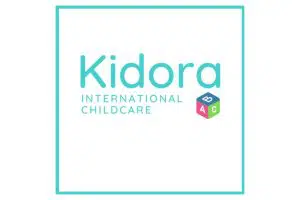 Cambodia: the Kidora daycare, a social enterprise
Cambodia: the Kidora daycare, a social enterprise
Our partners in the field
Samathapeap Khnom Organisation (SKO) : Cambodian NGO that improves the quality of life of disadvantaged families and the education of children.
Chamroeun Microfinance :
Cambodian microfinance institute that provides financial services to the poor.
Sipar:
NGO in Cambodia for more than 30 years to promote education and fight against illiteracy

